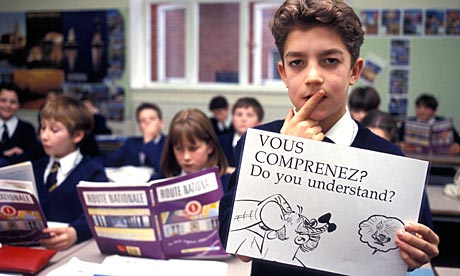Yesterday, Chris Hallquist put up a post in the Atheism channel titled “Everyone in America should fail to learn a foreign language” which I quite enjoyed, especially this section:
So they can have the experience of failing to learn a foreign language. You can learn a lot from failing to learn a foreign language. You learn about how languages work. About the features of English you never thought about before even though they’re around you constantly. About the ways in which English didn’t have to be the way it is.
If you’re really sharp, you might stop marvel at how amazing it is that you’re able to speak one language without having to really think about it. And if you don’t manage to have that thought on your own, you’ll at least be able to understand what the heck Steven Pinker is talking about when he makes it. (Seriously, I can’t conceive of what it’s like to read Pinker if you’ve never tried to learn a foreign language.) Ditto understanding AI researchers talk about how hard machine translation is.
I have languages on the the brain, since, this week, I’ve started using Duolingo + Beeminder to try to refresh my French. And when I get back to California, I get to file my paperwork to take a summer ASL class at the local community college. French was the first foreign language I learned (I’ve got about a year and a half of Latin stored somewhere), and I remember I got such a frisson from understanding the logic of a language. I found out what the subjunctive was (besides the thing that Tevye is using in “If I Were a Rich Man“). Learning that you can ask “Why?” about language and get different answers really makes you excited about playing and tinkering with them (perhaps a la Frindle).
I’m not sure that Duolingo or the community college class are the best ways to keep learning and reviewing, but they’re better than I’ve done on my own, without structure. So, this all makes me pretty nostalgic for my college debate group, which is how I started to learn to be fluent (or mostly to flounder) in other people’s ideological, epistemological, or philosophical dialects. I got to meet and tussle with brilliant people who disagreed with me and try to figure out when I should give ground and when they would.
There are plenty of websites that will help you review normal languages with spaced repetition, but I’m not aware of any program to help you review what it’s like to think like other people, so you get better at passing Ideological Turing Tests, and maybe empathy to boot. So, until that mythical service exists, may I recommend Arnold Kling’s The Three Languages of Politics as a booster shot?
Economist Arnold Kling tries to break down mainstream American politics into three main ways of thinking: Conservative, Progressive, and Libertarian. Each group has a different answer to the question: what are you protecting and from whom? Conservatives tend to defend civilization from barbarism, progressives guard the oppressed from their oppressors, and libertarians try to safeguard freedom from coercion.
Kling is like an ideological optometrist, giving you a possibly disorienting sense of what it’s like to look at the world from a different position. It’s easier to find ways to work together if you can see why your opponent loves what they’re trying to protect and you can avoid giving inadvertent offence. It’s not an accident Kling finds more than just a dichotomous split. Within either political party or any movement I’ve found, people can come to the same policy position for different reasons and be surprised or betrayed when they find out they disagree on a deeper level.
So, definitely worth a read. And I guess you’ll get some chance to practice if you try to pick out these three types in this summer’s Ideological Turing Test, which will probably take place in July, and I’ll start brainstorming formats for at the beginning of June.













